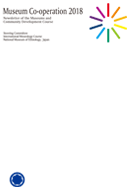Museums and Community Development
In this the twenty-first century, museums are becoming ever more important as contributors to the cultural reconstruction now underway as the world searches for new models for the nation-state and the world as a whole. Still, however, institutions like Minpaku, which offer comprehensive training in museology-museum theory and practice-are rare.
Under the sponsorship of the Japan International Cooperation Agency (JICA), Minpaku took the lead for a decade, starting in 1994, in offering a museology course to scholars from the developing world. It contributed to increasing expertise at many museums in developing countries and to building an international network of museums. Japanese participants affiliated with museums in Japan also benefitted, learning much from other participants.
In 2003, at the end of the first decade since the course was inaugurated, JICA was reorganized as an independent administrative institution. In April, 2004, Minpaku joined the National Institutes of the Humanities as part of the Inter-University Research Institute Corporation. Those changes were an opportunity to review the achievements of that first decade, revise several aspects of the course, and relaunched it as the Intensive Course on Museology.
Minpaku, which has been entrusted by JICA with overall responsibility for the new Intensive Course on Museology, has been joined in this project. Many other museums in Japan also contribute to the course. The international network of museums that Minpaku has built is an essential element in implementing training that reflects the current situation of museums in the trainees' countries. More sophisticated approaches to information and artifact management and museum administration have also had a great impact on reshaping the training.
The Intensive Course on Museology has also been redefined to place greater emphasis on the individuals responsible for hands-on work at their museums. In the past, the target group was somewhat ambiguous, so that executives wanting to learn about senior-level museum management and trainees eager to learn conservation, display, and other practical techniques were taking the course together, which sometimes caused problems. The Intensive Course is now clearly focused on the needs of trainees looking for practical skills.
After the Great East Japan Earthquake (2011), it was decided, since fiscal 2012, to enhance components related to safety and disaster prevention in the management of museum artifacts . Other additions to the course include contents which allowed trainees to plan the management of their museums, and to implement and disseminate their experience and knowledge acquired during the course to their museums. At the same time, the course also renewed its name to "Comprehensive Museology".
In 2015, the course developed and changed its name to “Museums and Community Development”, which includes the role of museums played in communities. The curriculum provides skills and knowledge to enhance community development through museums.
While the name of the course and its format have evolved, the goal remains unchanged: to promote international interaction and exchange with museums worldwide. As a result, we have accepted 258 participants from 60 countries and regions during its 20 years plus history.
List of Participants
Cooperation - Newsletter of the Museums and Community Development Course

- 2018[PDF file:6.26MB]
- 2017[PDF file:5.83MB]
- 2016[PDF file:5.10MB]
- 2015[PDF file: 3.10MB]
- 2014[PDF file: 6.07MB]
- 2013[PDF file: 5.99MB]
- 2012 [PDF file: 5.14MB]
- 2011 [PDF file: 3.75MB]
- 2010 [PDF file: 4.85MB]
- 2009 [PDF file: 24.8MB]
- 2008 [PDF file: 33.5MB]
- 2007 [PDF file: 95.4MB]
- 2006 [PDF file: 31.3MB]
※Some texts and illustrations for which we have not received copyright permission have been blacked out.
- 2005[PDF file: 20.5MB]
※Some texts and illustrations for which we have not received copyright permission have been blacked out.
- 2004[PDF file: 17.8MB]
- 2004(The 2003 Training Course)[PDF file: 2.3MB]
- 2002-2003[PDF file: 893KB]
Related publications
- Museums and Community Development [PDF file: 10MB]




